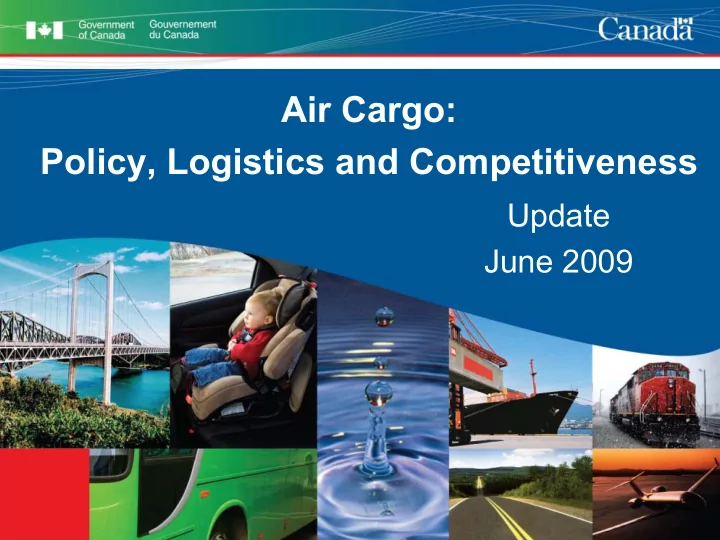

Air Cargo: Policy, Logistics and Competitiveness Update June 2009
Background • With the 2008 Air Cargo ministerial China mission as the impetus, the Department is undertaking an Air Cargo: Policy, Logistics and Competitiveness initiative in order to examine air cargo as part of the global/integrated supply chain. • The project will – help develop a greater understanding of the air cargo industry – facilitate the promotion of Canada’s gateway advantage • The project includes efforts not only to understand the way the industry operates, but also the rationale behind various industry decisions (e.g. choice of airport/market on both sides of the border). • Key Questions: – How can wealth creation potential of the Gateway initiatives be maximized and air cargo opportunities taken advantage of? – What should government do in its areas of responsibility? 2
Progress to Date… • Analytical work since 2008: air cargo policy analysis, air cargo data assessment and exploration of backhaul opportunities. • Two workshops attended by a diverse group of representatives (e.g. shippers, freight forwarders, carriers, airports) took place to improve communication and to facilitate collaboration between government, industry and academia. • Participants were challenged to examine policy (air transport agreements, transshipment, FTZ, security), gateway and logistics (logistic parks, cargo transfer) and data/knowledge gaps issues. 3
Moving forward • TC envisions making progress in five areas: – Competitiveness – Foreign Trade Zones (FTZ) – Fluidity – Facilitation – Data 4
Issue Timeline Action / Considerations Competitiveness Study: -TC has launched a research project to better FY09-10 understand total logistic costs, cargo costs structure and competitiveness issues raised at the workshops. This analysis will provide tools to examine Canada’s air cargo gateways competitiveness and catchment area. Policy: 2-3 - In line with the Gateway to the Americas concept, the years study will also be a building block to determine if cargo 6th freedom opportunities exist in Canada and assess impediments to their development. 5
Issue Timeline Action / Considerations FTZ FY09-10 -FTZ has been raised as an issue of importance by many stakeholders. -In partnership with experts from Finance Canada, the Canada Revenue Agency and the Canada Border Services Agency, TC organized outreach events in Edmonton and Winnipeg to share knowledge, facilitate networking and promote existing programs such as the Export Distribution Centre Program and the Duty-Deferral Program. -Some Canadian airports are already branding themselves as « FTZ-equivalent ». -Since the taxation regime in Canada is very different vs. the U.S., there may be a need to better understand and develop case studies of airport-located FTZ, their impacts on competitiveness and associated costs-- TC must work with other departments. 6
Issue Timeline Action / Considerations Fluidity 1 year -As part of marketing tools at the disposal of government and stakeholders, there is a need to appreciate/quantify the connectivity and fluidity of the Canadian air cargo supply chain. -TC is developing a system-wide fluidity-indicator for the air cargo supply chain. The work is conducted in parallel to IATA’s Cargo 2000 initiative that aims to develop new quality management system and performance indicators for worldwide air cargo. - Some data partnerships have been secured and analytical work is underway. 7
Issue Timeline Action / Considerations Facilitation Short to -Some stakeholders signal that the doing-business medium environment could be more conducive and that efforts term should be directed to harmonization and facilitation, for example with the Canada Border Services Agency (e.g. e-freight, access, warehouses) and the Canadian Food Inspection Agency (e.g. live animals). -While many facilitation issues are outside its direct purview, TC will make inroads to other Government departments to engage in a discussion and determine where facilitation efforts would be the most desirable. -There are also possibilities for joint policy research on cargo security. 8
Issue Timeline Action / Considerations Data 1.5 year -Canada remains short on cargo flow data that is critical (CTA to inform decision-making and marketing plans. regulations) -The development of regulations of the Canada Transportation Act will clarify responsibility on the collection/sharing of cargo data. FY09-10 (trade flows -TC is conducting an analysis to better understand air and cargo commodity and trade flows with key Gateway countries/regions using trade data from Statistics Canada. Council studies) -TC will collaborate to the extent possible with the Greater Vancouver Gateway Council and Western Economic Diversification on the Vancouver regional cargo flows studies. 9
Next Steps • Air Cargo: Policy, Logistics and Competitiveness research phase sunsets in FY09-10 • Stakeholders are looking for data and toolbox to develop value-added proposals and facilitate marketing. • TC will pursue marketing opportunities with DFAIT and continue engaging stakeholders through bilateral meetings. • Report back on progress – workshop in Fall 2009 10
For more information… Félix Meunier Louis-Paul Tardif Alain Lumbroso International Air Policy Economic Analysis Economic Analysis Felix.meunier@tc.gc.ca louis-paul.tardif@tc.gc.ca alain.lumbroso@tc.gc.ca 11 (613) 949-8634 (613) 991-6982 (514) 633-3431
Recommend
More recommend